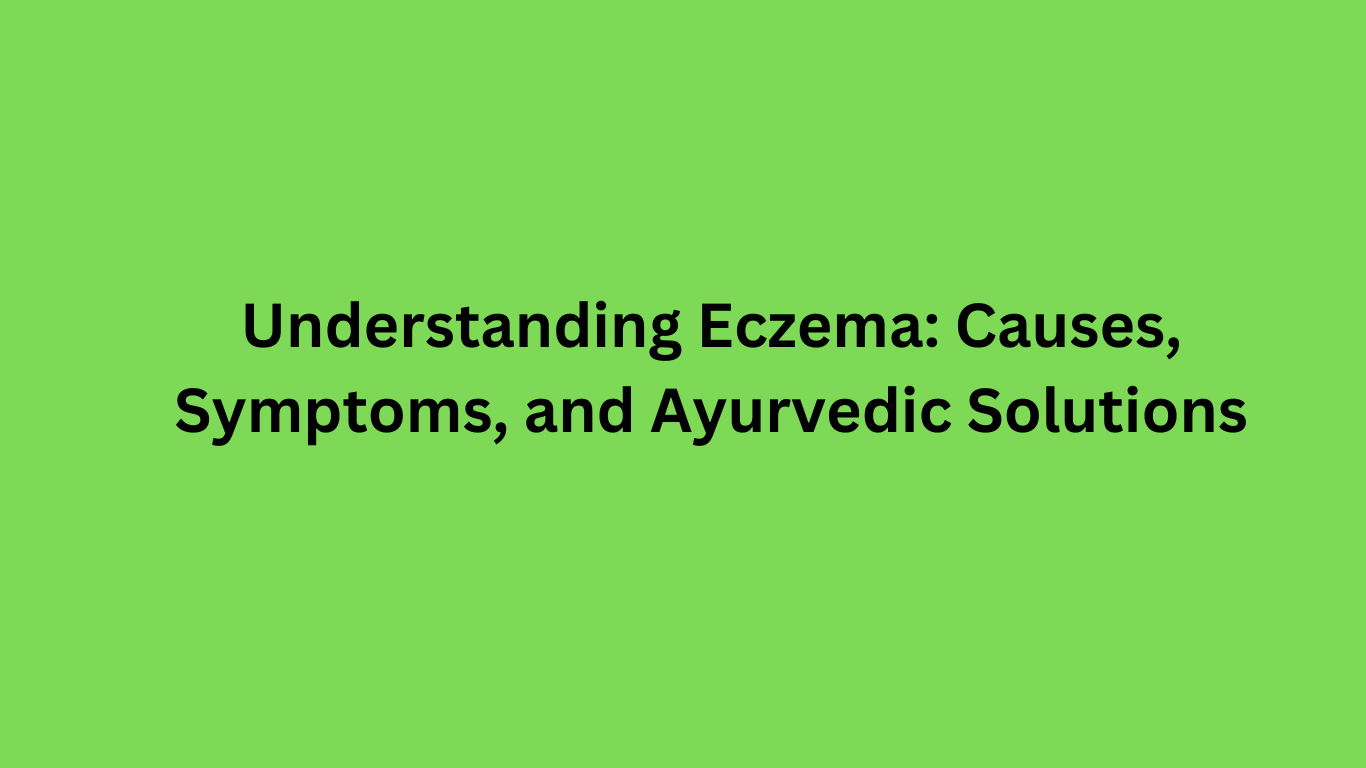Eczema, a chronic inflammatory skin condition, affects millions worldwide, causing discomfort, itching, and skin irritation. While conventional treatments offer temporary relief, Ayurveda, the ancient Indian system of medicine, provides a holistic approach that targets the root cause of eczema and promotes long-lasting skin health. In this blog, we will explore the causes, symptoms, and Ayurvedic solutions for managing eczema naturally.
What is Eczema?
Eczema, also known as Atopic Dermatitis, is a skin disorder characterized by redness, dryness, and intense itching. It results from an overactive immune response to environmental triggers, leading to inflammation and skin barrier dysfunction. The condition can range from mild to severe, affecting various parts of the body, including the face, hands, and feet.
Causes of Eczema
From an Ayurvedic perspective, eczema is primarily caused by an imbalance in the body’s doshas—Vata, Pitta, and Kapha. Several factors contribute to this imbalance:
1. Genetic Predisposition
Eczema often runs in families, indicating a genetic component. If one or both parents have a history of eczema or allergic conditions, their children are more likely to develop it.
2. Immune System Dysfunction
An overactive immune system can cause the body to react strongly to allergens, irritants, and environmental triggers, leading to chronic inflammation and skin irritation.
3. Environmental Factors
Exposure to allergens like dust, pollen, pet dander, and harsh chemicals can trigger eczema flare-ups. Seasonal changes, excessive humidity, or dry weather can also aggravate symptoms.
4. Dietary Factors
Certain foods, such as dairy, gluten, processed foods, and excessive spicy or oily foods, can contribute to eczema by aggravating Pitta dosha.
5. Stress and Emotional Health
Mental stress and anxiety can worsen eczema symptoms, as they disrupt the balance of the doshas, especially Vata and Pitta.
6. Skin Irritants
Soaps, detergents, synthetic fabrics, and cosmetic products with harsh chemicals can lead to skin irritation and exacerbate eczema symptoms.
Symptoms of Eczema
Eczema manifests differently in individuals, but common symptoms include:
- Dry, scaly, and rough skin
- Intense itching, especially at night
- Red, inflamed, or swollen patches of skin
- Cracks or blisters that may ooze fluid
- Darkened skin in affected areas
- Increased sensitivity to environmental triggers
Ayurvedic Approach to Eczema Treatment
Ayurveda aims to balance the body’s doshas and detoxify the system to provide long-lasting relief from eczema. Here are some effective Ayurvedic treatments:
1. Detoxification (Panchakarma Therapy)
Panchakarma is a cleansing therapy that helps remove toxins (Ama) from the body, which is essential for treating eczema. Treatments like Vamana (therapeutic vomiting) and Virechana (purgation therapy) help eliminate excess Pitta and balance the doshas.
2. Herbal Remedies for Eczema
Several Ayurvedic herbs have anti-inflammatory, cooling, and healing properties that help soothe eczema:
- Neem (Azadirachta indica): Acts as a natural antiseptic and reduces itching.
- Turmeric (Curcuma longa): Has anti-inflammatory and antibacterial properties.
- Aloe Vera: Hydrates and calms irritated skin.
- Manjistha (Rubia cordifolia): Purifies the blood and reduces skin inflammation.
- Guduchi (Tinospora cordifolia): Strengthens immunity and reduces allergic reactions.
3. Ayurvedic Oils for Skin Nourishment
Using medicated oils can help soothe eczema symptoms:
- Kumkumadi Tailam: Improves skin texture and heals scars.
- Coconut Oil: Provides deep hydration and reduces inflammation.
- Mahamarichyadi Tailam: Helps in treating chronic skin diseases.
4. Dietary and Lifestyle Modifications
A balanced diet and proper lifestyle are crucial in Ayurvedic eczema treatment:
- Avoid spicy, fried, and processed foods. Opt for cooling foods like cucumber, coconut water, and fresh fruits.
- Include ghee and turmeric in your diet to reduce inflammation.
- Stay hydrated by drinking herbal teas and plenty of water.
- Practice stress management techniques like meditation, yoga, and deep breathing.
- Use natural and organic skincare products to prevent irritation.
5. Ayurvedic Home Remedies for Eczema Relief
- Aloe Vera Gel: Apply fresh aloe vera gel to soothe itching and inflammation.
- Turmeric Paste: Mix turmeric with milk and apply it to the affected areas.
- Neem Leaves Bath: Boil neem leaves in water and use it for bathing to reduce skin infections.
- Sandalwood Paste: Helps in cooling and calming inflamed skin.
Conclusion
Eczema can be a persistent skin condition, but with the right Ayurvedic approach, it can be effectively managed. Ayurvedic treatment for eczema in Kerala focuses on restoring the body’s natural balance, detoxifying the system, and nourishing the skin with herbal remedies and lifestyle changes. If you or your loved one is struggling with eczema, consider Ayurveda as a holistic and natural way to achieve healthier skin.
At Padanjali Ayurvedics, we offer personalized Ayurvedic treatment for eczema, helping you find long-term relief. Book a consultation today and take the first step towards radiant and eczema-free skin.









